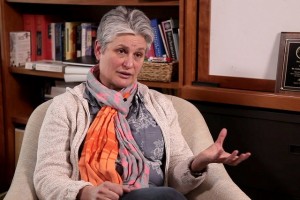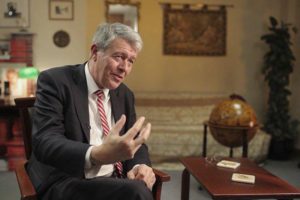Genomic Imprinting and the Brain
Biologist Catherine Dulac on the maternal-paternal genomic conflict, its influence on the growth of embryos, a...
What are the trade-offs of having a brain as developed as that in humans? Do you really always remember how to ride a bicycle? Jeremy R. Knowles Professor of Molecular and Cellular Biology at Harvard University, Jeff Lichtman, speaks on what separates humans from other animals in terms of neurobiology.
Although there is an instruction book that makes our nervous system, our genome, many of the things we do with our nervous system are mostly related to our behavioral repertoire, which does not come from our genes. If you happened to be born into a Russian-speaking family, you will speak Russian. That same child, if they’re born or adopted at an early age into a family of people who speak English, will speak English. If you’re given a tennis racquet at a young age, you probably will play tennis reasonably well. If you’re given a violin, you’ll be able to play violin.
I have postdoctoral fellows over 30 who are still considered students. We still call them trainees, we’re still learning at this advanced age. This is part of the great strength and weakness of being a human being. The strength is that we end up with a nervous system that is tuned to the world we find ourselves in. The great weakness is that we are helpless for a vast part of our lives. We are not self-sufficient until we’re quite old. If you want to understand how the brain works, you’re basically going to have to understand how it is that information about the world gets instantiated into the physicality of the brain.
Children who are remarkably precocious know how to do things at an earlier age than other kids. They are clearly what you would call a genius at a young age and then this book traces their life trajectory later on and they do learn extraordinarily fast, but they plateau just at an earlier age. They don’t necessarily become great thinkers, they just reach the adult state quicker, they just go through it at a much quicker rate. So I’m not sure that there’s any real advantage to being a quick learner. The most important thing is of course to continue to take information in about the world. Maybe this is what separates humans from most other animals that have to survive on their own at an earlier stage. These animals can’t remain in this learning state, they have to grow up quickly.

Biologist Catherine Dulac on the maternal-paternal genomic conflict, its influence on the growth of embryos, a...

Neuroscientist Karl Friston on split personality, the nature of mental disorders, and the possibility of a the...

Neuroscientist Diana Omigie on tuning systems in different cultures, congenital amusia and aspects that influe...